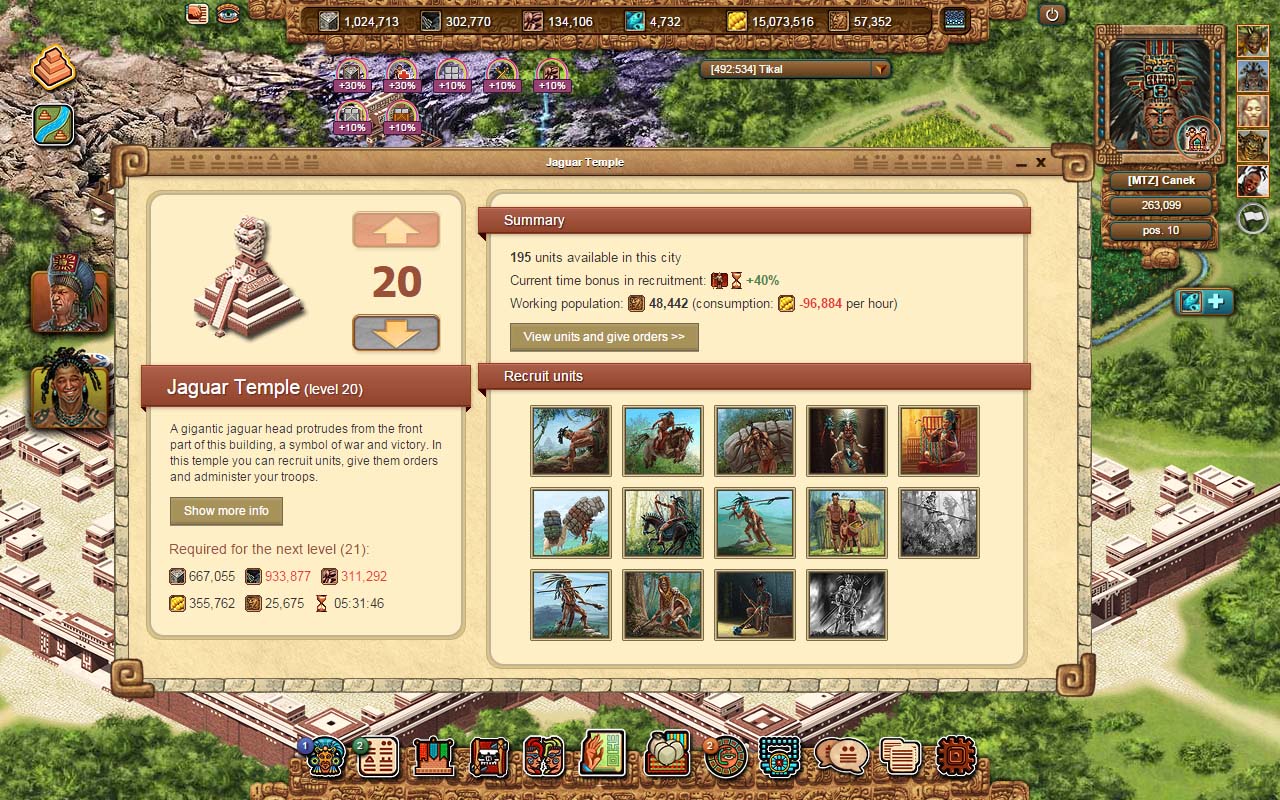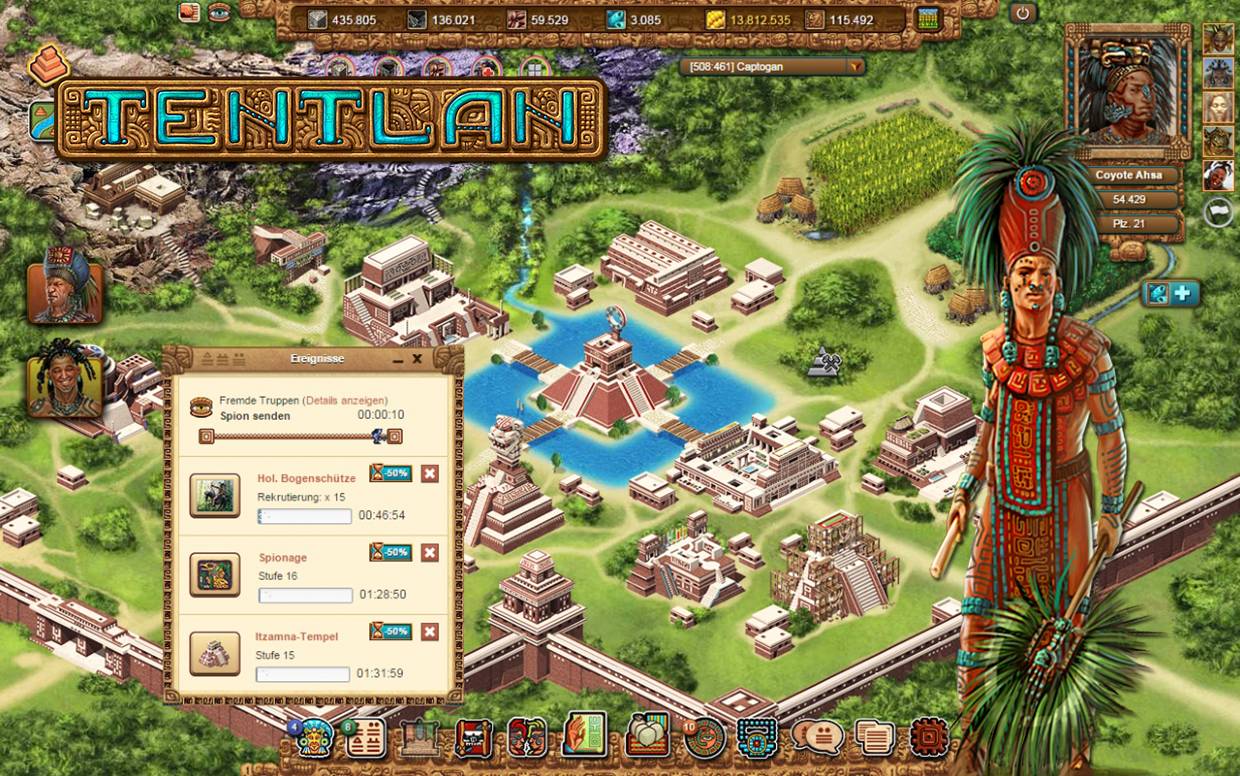
Tentlan
| Genre: Strategy |
| Rating: |
Tentlan Review: A Strategy Game That Whispers Instead of Shouts
Remember the first time you played a game that didn’t rush you? Where the silence between moments said more than the actions themselves? Tentlan is that game. It’s not loud, not flashy—but it knows exactly what it’s doing. And it’s doing it with feathers, obsidian, and a whole lot of patience.


A City Builder with a Soul
Most city-building games hit you with the same formula: place, upgrade, expand—repeat until it feels like work. Tentlan doesn’t follow that beat. It moves differently. The game invites you into a lush, Mesoamerican world, rich with history and humming with quiet spiritual energy. You don’t just build cities; you shape a civilization steeped in ritual and rhythm.
From your first steps, it feels different. There’s no heavy-handed tutorial barking orders. Instead, you get a slow nudge, almost like a village elder whispering in your ear. The art is subtle—earthy tones, detailed structures, soft ambient music. It doesn’t overwhelm; it pulls you in, gently.
The setting? A massive breath of fresh air. While most strategy games go for medieval castles or sci-fi galaxies, Tentlan turns the spotlight on ancient Mayan and Aztec cultures. Think stepped pyramids instead of towers, cocoa instead of coins. That choice alone brings a layer of richness you rarely see in this genre.
The Rhythm of Real-Time Strategy
Now, don’t get the wrong idea—just because it’s peaceful doesn’t mean it’s idle. Tentlan runs in real-time, and that adds a kind of quiet tension. Build times stretch into hours. Research can span an entire day. And yes, that means waiting. But you know what? That’s actually kind of the point.
It’s strategy with a long fuse. Like baking slow sourdough or playing a marathon game of chess, it rewards planning. There’s a certain calm that comes with checking your progress in the morning, queuing up a temple upgrade, and knowing it’ll be done by lunch. You learn to anticipate. To prepare.
It also teaches patience the hard way. Make a rash decision, and you could lose a key troop unit or delay a critical research tier. It’s not a game where you spam buttons and hope for the best. It’s a slow burn—deliberate, thoughtful, satisfying.
Not Just About War (But Also Kinda About War)
Okay, let’s talk about the other side of the coin. Tentlan may look serene, but behind those temple walls, warfare simmers quietly. And when it explodes, it’s exhilarating.
You can scout, raid, spy, form alliances, and launch full-on attacks. But unlike other games where combat is the whole show, here it’s more like a high-stakes chess match. You don’t just click “attack” and cross your fingers. You plan. You observe your enemy’s timings. You use the calendar to your advantage.
The fun part? Stealth. Send a spy to a rival city and hope they don’t get caught. Or maybe you launch a night raid when they’re likely asleep or offline—hey, it happens. There’s real satisfaction in pulling off a well-timed assault. But there’s just as much joy in fending one off.
And resource warfare? That’s its own beast. You need obsidian, jade, corn, and—yes—cocoa, and the battle to control those can be as intense as any fight. Sometimes, diplomacy is your best weapon. Other times, it’s a battering ram.
Rituals, Rain, and Research
Here’s where Tentlan gets really clever. It doesn’t just give you tech trees—it gives you rituals. Literally. You don’t just research new upgrades; you perform ceremonies tied to a sacred calendar. This isn't just flavor text. It affects your gameplay. Time your ritual with the right moon phase, and you might just boost your troop speed or production rate.
The seasonal calendar system is, frankly, fascinating. You have rain rituals that boost crops. War rituals to prep for battle. It adds a kind of meta-layer that’s oddly poetic. You find yourself planning not just by time, but by season. It’s like syncing your game strategy with nature’s pulse.
Some players find it gimmicky, but honestly? It grows on you. Once you get into the flow, it feels organic—like the game is reminding you to think cyclically, not linearly. Just like real ancient civilizations did.
And let’s talk about the research tree. It’s vast, sure, but also thematically cohesive. Every tech—whether it’s astronomy, herbal medicine, or military tactics—feels like a page from a codex rather than a spreadsheet.
Community Matters More Than You’d Expect
Now here’s a plot twist: Tentlan has one of the most unexpectedly wholesome online communities I’ve ever stumbled into. You’d think a game rooted in conquest might attract trolls and power-hungry maniacs. But no—there’s a surprising vibe of cooperation, even mentorship.
Veteran players actually help newcomers. They explain mechanics, recommend builds, even offer protection. It’s not uncommon to get a whisper message from someone just checking in on how your progress is going. It's like the neighborly version of Game of Thrones.
And alliances? They matter. A lot. These aren’t just guilds with funny names—they’re power structures. You forge bonds, negotiate borders, trade resources. And occasionally, sure, you get backstabbed. But even that feels...earned. Like you missed a cue. Like you forgot to read the room.
There’s a depth here that sneaks up on you. It starts with chatting casually in global, and before long you’re part of a multi-tribe alliance plotting the next big siege. It’s social strategy, and it’s alive.
The Quiet Hook of Daily Return
Here’s the part that really sealed the deal for me: Tentlan doesn’t nag you to log in. It doesn’t flash endless red notifications or manipulate you with urgency. Instead, it gently pulls you back.
Daily logins feel more like a morning ritual than a chore. You check your crops. Queue up your buildings. Maybe peek at a rival’s base. It takes five minutes, or maybe an hour—depends on your mood. That flexibility? Gold.
There’s a subtle loop here. Each day you nudge your empire a little further. And every small win—completing a structure, researching a new tech—feels tangible. It’s that “just one more thing” effect, but without the burnout. You come back not out of compulsion, but because you want to see what’s changed.
It becomes part of your routine. Like feeding a sourdough starter or watering a bonsai tree. Small effort, steady payoff.
But Let’s Be Honest…
Alright, let’s not pretend it’s perfect.
First off, if you’re the type who craves instant gratification, Tentlan might drive you up the wall. Everything takes time. Sometimes too much time. And yes, there are moments where you’ll click something and think, “Wait—why did that just happen?” The UI can be...let’s call it “quirky.”
The calendar system? As much as I enjoy it, it’s not exactly intuitive at first. You’ll probably need a wiki open for the first week or so, just to make sense of the rituals and troop timings. But again, it’s the kind of confusion that slowly turns into mastery. Like learning to read a map upside down—you’ll get there.
Also, battles can feel a little abstract. There’s no flashy combat animation or cinematic payoff. It’s mostly reports and stats. Some folks love the purity of that. Others might miss the visual flair.
But here’s the kicker: those rough edges? They’re oddly endearing. They give the game character. It’s like an old, well-loved board game—maybe the edges are worn, but that’s part of the charm.
Final Thoughts – A Strategy Game That Breathes
If you’ve made it this far, you’re probably already the kind of player Tentlan is meant for.
This isn’t a game you “beat.” It’s one you inhabit. It doesn’t push. It doesn’t demand. It invites. Whether you're the kind of person who color-codes spreadsheets or just enjoys slow, purposeful progress, there’s something quietly captivating here.
It’s a strategy game that breathes. It teaches rhythm, not reaction. Planning, not panic. And that’s rare. Especially these days.
So if you’re tired of noise—of games that shout and flash and flood your screen—Tentlan might be the pause you didn’t know you needed. It’s not just about building cities or commanding armies. It’s about remembering the power of waiting. Of watching. Of wondering what the next season might bring.
And really—how many games can say that?